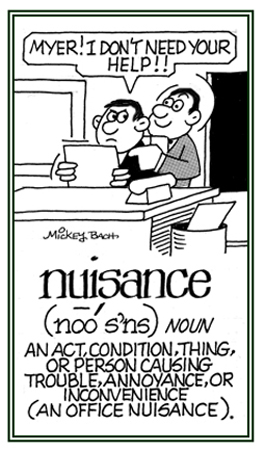A nuance is a shade of awareness or intent, a subtle variation, as when a poem expresses different nuances of sentiments.
That noisy disruptive child was always a big nuisance when his mother took him shopping with her.
It is such a nuisance having to explain the nuance of a story to the listener who does not understand Celtic mythology.
2. Anything which is offensive or noxious: John's wife was complaining that the noise from the electric fan was a real nuisance!
Too often, weather forecasts presented on TV, or the radio, become nuisances because they are wrong.
3. An annoying or irritating person, practice, or thing: The excessively talkative student was a nuisance for the teacher and the rest of the class.Ted considered all of the e-mails that he receives on his computer from unknown sources nothing more than nuisances; especially, those that claim he has become the beneficiary of thousands or millions of dollars!
4. Etymology: "injury, hurt, harm," from Anglo-French nusaunce, from Old French nuisance, from nuire, "to harm"; from Latin nocere, "to hurt".The sense has softened over time, to "anything obnoxious to a community" (bad smells, pests, eyesores), in about 1661, then it became a "source of annoyance, something personally disagreeable"; from about 1831. The application to people was from about 1695.

